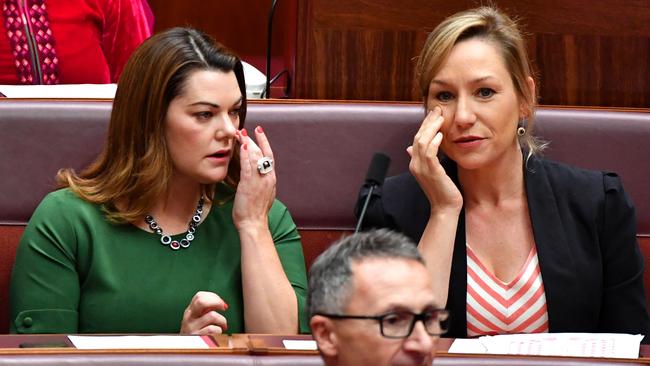Greens desperate to save Gaia, as long as salvation isn’t nuclear

What do Clive Palmer, Tony Abbott, Cory Bernardi, Barnaby Joyce, Mark Latham, Jim Molan, Craig Kelly, Eric Abetz and David Leyonhjelm have in common? … they all support nuclear power. Jim Green from Friends of the Earth Australia (says) that nuclear energy now functions more as a culture war troll than a serious policy, not least because the people who want an atomic solution to climate change are usually the same people … who don’t believe climate change requires a solution at all.
Arts journo Ben Eltham, Twitter, July 1:
Back in 2012 I did a major investigation of energy policy ... One of the first things an energy analyst said to me was “baseload is a myth”. 2012.
Chemist and nuclear tech wonk Oscar Archer, Medium.com, July 2:
Outside of social media and partisan energy commentary (baseload) means that (electricity is) there to serve demand when there’s demand … So why does “baseload” get dismissed as a myth? Predominantly, because it has also long been used to describe nuclear energy. Some people really don’t like to hear anything positive about nuclear energy, and this includes the idea that it’s practically always on, constantly serving demand. Why is this so important? Because other people can point at nation-size electrical grids and immediately see a) a slab of nuclear “baseload”, and b) dramatically low emissions intensities.
Greens senator Sarah Hanson-Young, Guardian Australia, June 5:
Talk of overturning the ban on nuclear power in Australia is crackpot stuff … Aside from being a dangerous technology, nuclear power is wildly expensive …
University of NSW nuclear engineer Ed Obbard, Twitter, June 5:
… if #nuclear is nonviable because it’s expensive, why do we need to ban it?
Event hosted by Students for Nuclear Energy, July 1:
Members of Women in Nuclear Australia will be joining us at UNSW for a panel style event to talk about their kick-ass careers …
Sign up. UNSW nuclear engineering masters program:
Nuclear engineering continues to be a growing field. In addition to the increasing number of “new build” proposals in the Western world, existing reactors require maintenance, servicing, operations and eventual decommissioning; waste needs to be managed and the fuel cycle requires servicing and handling.
Political scientist Joshua S. Goldstein and energy engineer Staffan A. Qvist, The Wall Street Journal, January 11:
Although costs have dropped dramatically for solar and wind energy, they are not a direct, reliable replacement for coal and gas. When the sun doesn’t shine or the wind doesn’t blow, little or no energy is collected. And when nature does co-operate, the energy is sometimes wasted because it can’t be stored affordably. Bill Gates, who has invested $1 billion in renewables, notes that “there’s no battery technology that’s even close to allowing us to take all of our energy from renewables”. If substantially expanded, wind, solar and hydropower also would destroy vast tracts of farmland and forest. What the world needs is a carbon-free source of electricity that can be ramped up to massive scale very quickly and provide power reliably around the clock, regardless of weather conditions — all without expanding the total acreage devoted to electric generation. Nuclear power meets all of those requirements.


First with the news. Jeff Sparrow, Guardian Australia, June 24: